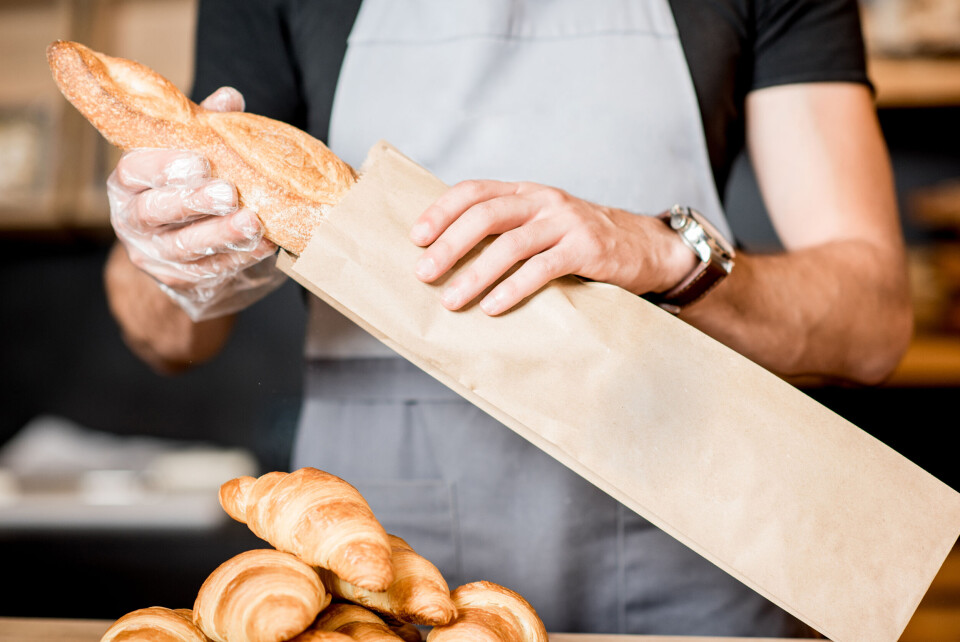-
French crisps brand gains global attention after Dua Lipa post
Singer posted photo of her shopping basket and the only food items were Brets crisps in braised chicken, honey mustard, and ‘Fromage du Jura’ flavours
-
Why supermarkets are urging shoppers to buy French leeks
Try our French classic leek vinaigrette recipe
-
New bill targets skiers under influence of alcohol or drugs
There are not currently any specific rules on skiing while under the influence
‘Bakeries will die’: Anger in France at Leclerc’s 29-centime baguette
Bakers and millers say the supermarket giant’s pricing plan is a ‘slap in the face’ and will threaten independent bakeries

The bakery industry in France has reacted angrily after supermarket giant Leclerc announced plans to sell baguettes for just 29 centimes for four months.
Leclerc launched a publicity campaign to announce its plan, calling it a “freeze” on the price of bread and pledging to keep the cost of a baguette at the unparalleled low price until April.
The amount is 10 centimes less than its supermarket competitors Intermarché and Super U, 16 centimes less than baguettes at Carrefour, and considerably less than the cost of baguettes in many independent bakeries.
‘A slap in the face’
Leading figures in the cereal and bread-making industries have responded angrily, saying that the price amounts to unfair competition and will put local bakeries at risk of dying out.
Farming union FNSEA said it would put unbearable pressure on independent bakers.
It told FranceInfo: “Cereals and flour are seeing high prices right now, and production costs are rising strongly…and [figures from statistics institute l’Institut national de la statistique et des études économiques Insee] show that in France in 2021, the average price of a baguette was 90 centimes.”
Christiane Lambert, FNSEA president, said: “Mr Leclerc will need to explain to us how he plans to pay bakers by charging 29 centimes per baguette.” She called the move a “slap in the face”.
Jean-François Loiseau, president of milling industry group l’Association Nationale de la Meunerie Française (ANMF), said: “What Leclerc is doing is shameful. We are looking to keep jobs and maintain high-quality standards, and this has a cost.
“You have to pay people properly; the ones who plant, harvest, make flour, and make the bread.”
Mr Loiseau said that the price of flour had risen by 30% in a year, and demanded to know where the Leclerc group buys its flour, and “what products will make up for this”.
Read more: Cost of baguettes set to rise amid flour and labour shortages
Dominique Anract, president of baking and patisserie group la Confédération de la boulangerie-pâtisserie française denounced the move as a “disloyal competition” and a “massive PR coup” that will do “damage to boulangeries, especially in villages”.
He told FranceInfo: “We are angry. This is the difference between making bread and making money.”
He highlighted the importance of local bakeries to France, and keeping them “alive”. He said: “In the whole world, we are the only country to have bakeries everywhere, a maximum of 700 metres away.
“We have 33,000 bakeries, large and small, in town centres and in the mountains, which depend on selling 300 baguettes per day. [Leclerc] has already made independent petrol stations disappear. If bakers have to compete with this price for baguettes, in four months, they’ll die out too.”
Leclerc responds
But head of the Leclerc group, Michel-Edouard Leclerc, has responded to critics, seeking to play down the furore.
He told Capital: “I’m not here to cause controversy. Around 30 centimes has been the average price of a baguette in Leclerc centres for at least a year.
“In the context of everything going up in price, we wanted to give a signal that Leclerc will do everything we can to ensure prices remain accessible for consumers.”
He said that selling a baguette, which he called a “key product”, was a symbolic move, and a “sign of confidence” for consumers.
He said that Leclerc was committed to sticking to the ‘loi Egalim’ – a law that states that supermarkets may not sell items at prices that mean suppliers and farmers sell at a loss.
A spokesperson for the group later said that the baguette price would be “100% financed by our shops, which will cut into their margins so they can offer this price”.
























